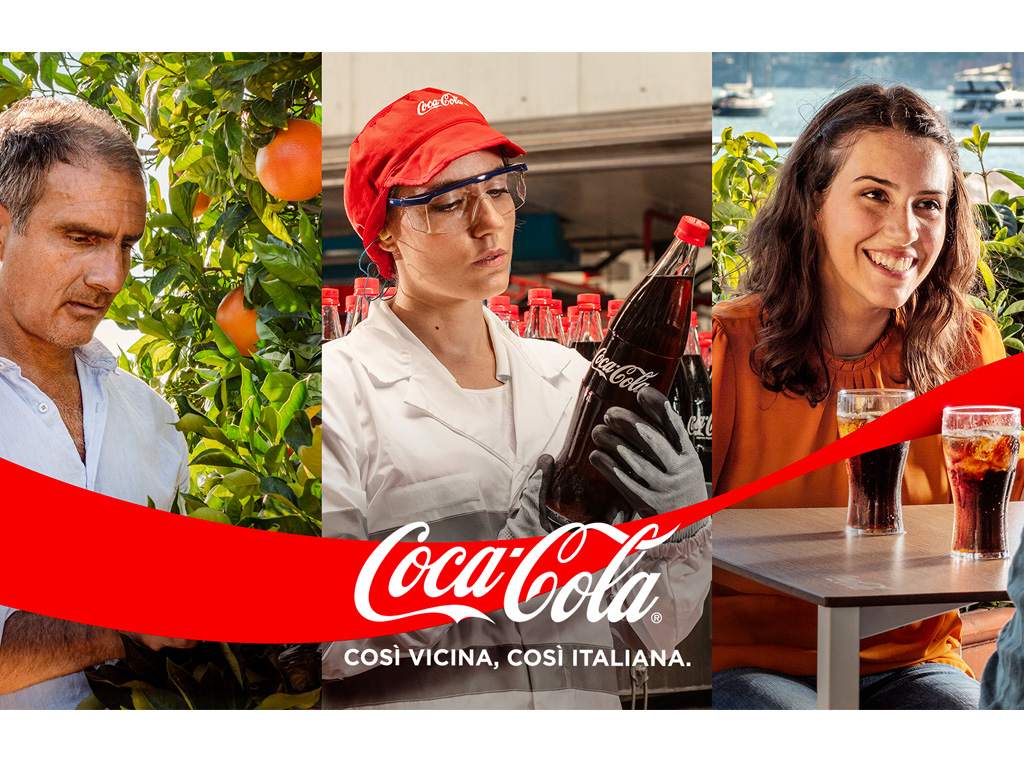Milan, 21 September 2023 – In terms of resources distributed to households, businesses and the State and the overall employment impact it generates, Coca-Cola confirms itself as the leading company in the soft drinks and beverages sector in Italy. According to research carried out by SDA Bocconi School of Management on the socio-economic impact of Coca-Cola Italia, Coca-Cola HBC Italia and Sibeg, the three companies representing Coca-Cola in Italy, in 2022 the resources generated and distributed to the main players of the Italian economy in the form of salaries amounted to 1.2 billion euros (equal to 0.06% of the national GDP), purchases of goods and services, investments, taxes and contributions.
Coca-Cola, which is present with its offices and plants from North to South, in Piedmont, Lombardy, Veneto, Abruzzo, Campania, Basilicata and Sicily, confirms itself as the first employer in the soft drinks and beverage industry: it creates directly and through its allied industries 26,738 jobs (0.1% of total employment in Italy), with a total of over 60,000 people who benefit - partially or totally - from the labour income generated (directly and indirectly). According to data from SDA Bocconi School of Management, every direct employee job corresponds to 11 total jobs within the Italian economy. The analysis also highlights Coca-Cola's commitment to an inclusive work environment that values talent: compared to the Italian average, in the three companies there is a greater incidence of women in leadership positions, with a higher number of women executives (45% compared to 18%) and middle managers (39% compared to 31%), while with the same professional qualification there is less inequality in the salaries of direct employees between the remuneration of executives and that of other categories.
The hypothetical scenario of Coca-Cola's lack of economic impact in the country would therefore translate into an increase in the number of unemployed in terms of employment, particularly in the regions where it is present with offices and plants: +2.4% in Piedmont, +5.6% in Lombardy, +2.9% in Veneto, +2.8% in Abruzzo, +0.5% in Campania, +1.4% in Basilicata and +0.4% in Sicily.
SDA Bocconi's data highlight the strong bond that unites Coca-Cola to the Italian context and the desire to be an active part of it: a bond that starts from the people who take care of the raw materials used in the products, passes through those who work every day in the 7 Italian regions where it is present and travels throughout the country through the sales force and the network of suppliers to create shared value, reaching consumers. It is precisely this path and the relationship with the supply chain that makes Coca-Cola "So close, so Italian", as the report also recalls in its title.
Coca-Cola's closeness to Italian excellence is reflected in the choice to use 100% Italian orange juice for Fanta, founded in Naples in 1955, together with that of "Arancia Rossa di Sicilia IGP" for Fanta Aranciata Rossa with No Added Sugar and "Limone di Siracusa IGP" for Fanta Lemonade with No Added Sugar, with the guarantee of quality of the respective Consortia, in addition to the local ingredients that it helps to enhance through the Lurisia beverage brand, such as Savona chinotti.
There are a total of 1,463 suppliers with whom Coca-Cola has economic relationships for the purchase of goods and services, for a value of 628 million euros (82% are medium-sized, small and micro local enterprises).
Investments on the path towards an increasingly circular economy
Coca-Cola's long-term global strategy "World Without Waste", launched in 2018, aims to work on the entire life cycle of packaging, from design and manufacturing to recycling. Coca-Cola was the first soft drink company to introduce a 100% rPET (recycled PET) bottle on the Italian market and since 2023 all PET bottles in the entire soft drink portfolio have been made from this material, as always 100% recyclable. A milestone made possible also thanks to the reopening of CCH CircularPET's Gaglianico factory, a center of excellence in innovation and environmental sustainability, with pioneering technologies in Europe for the processing of recycled PET which, with over 30 million euros of investment, has been converted from a disused bottling plant into an innovative plant capable of transforming up to 30,000 tons of PET per year in new 100% recycled PET bottles. In addition to this, in Italy over the years Coca-Cola has invested in the constant reduction of the weight of primary packaging and has introduced "Tethered Caps" on all the brands in the portfolio in the last year, with the aim of reducing the dispersion of plastic into the environment, anticipating the provisions contained in the EU directive on single-use plastics.
Proximity to the communities of which Coca-Cola is a part
Finally, the research highlights the attention to the local communities in which Coca-Cola is active. In fact, in the two-year period 2021-2022 alone, it has chosen to support realities and initiatives in Italy that work on issues of great social impact, for a total of 87 projects and a total value of almost 2 million euros. Numerous projects have been carried out in recent years: from the support of the Sicilian citrus supply chain for a conscious use of water resources through new technologies and the dissemination of good practices among the companies of the Citrus Production District of Sicily, to the multi-year collaboration with the Food Bank, from the support to Special Olympics, a sports movement that in Italy involves over 12,000 athletes with intellectual disabilities and of which Coca-Cola is a founding member, up to the #YouthEmpowered program, which since 2018 has accompanied over 200,000 young people in the transition from the world of school to the labor market.
Read more about: https://impattosocioeconomico.coca-cola.it/

